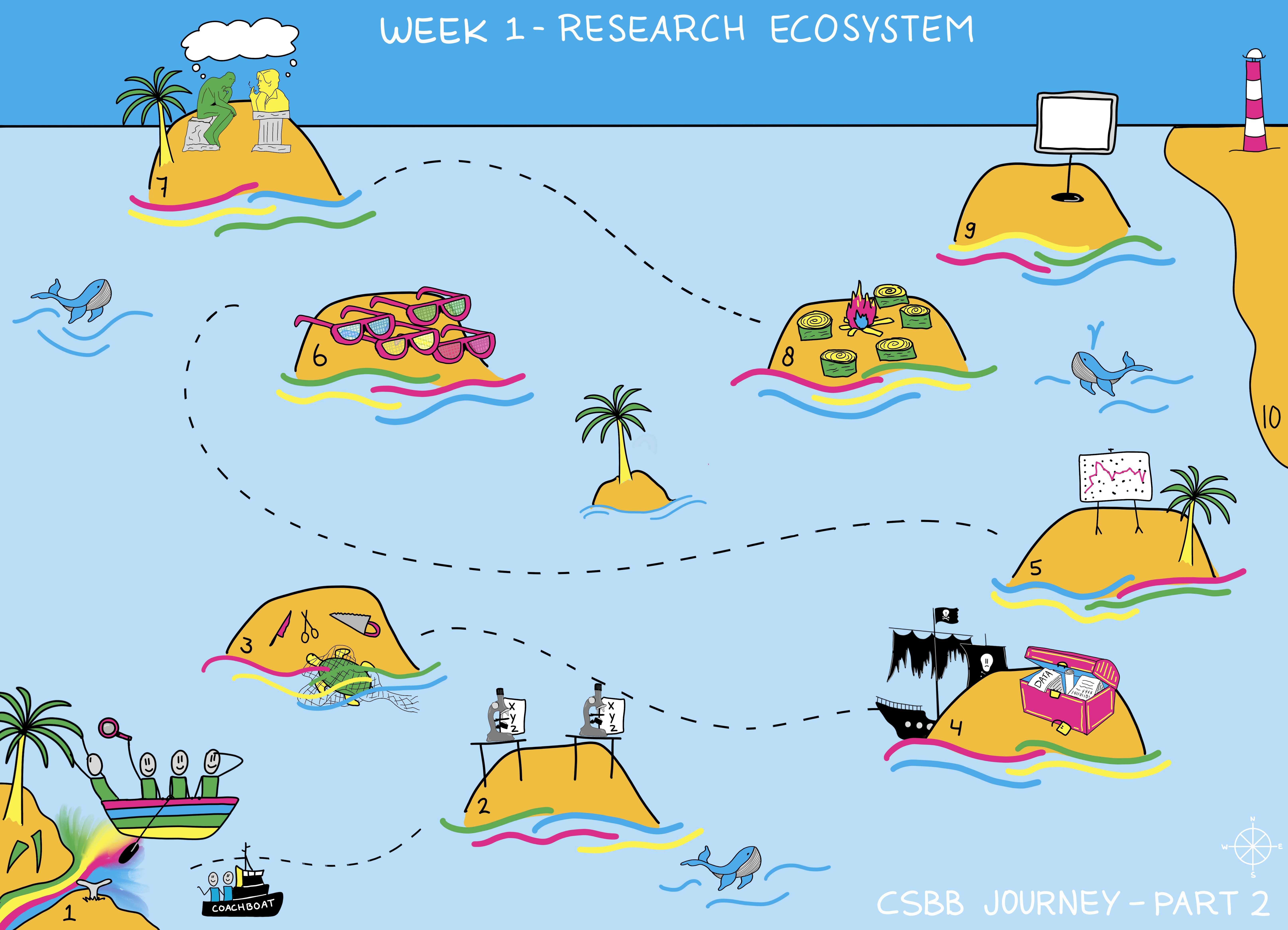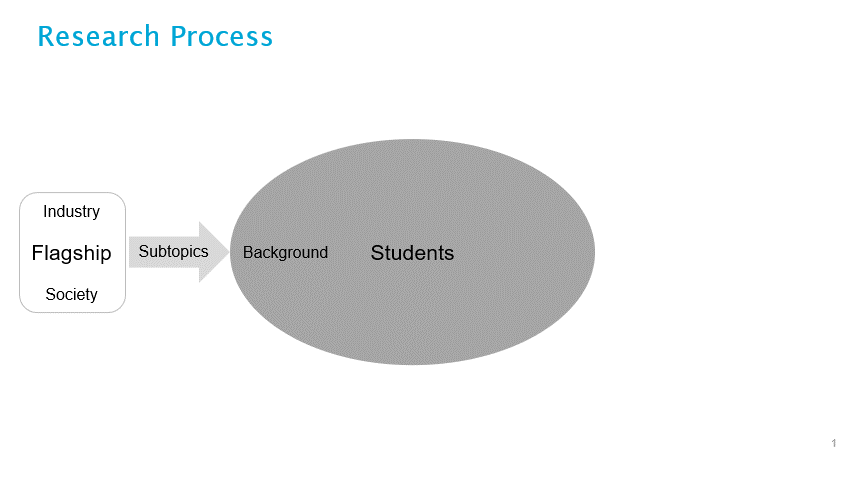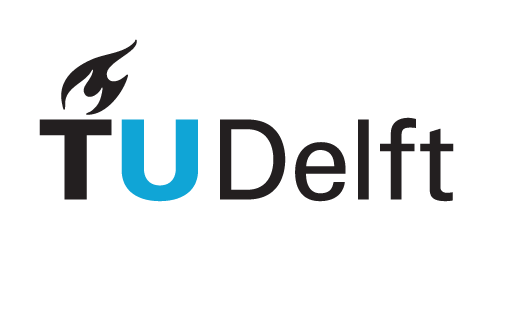
Week 2.1: The Research Ecosystem#
In this quarter, we will journey through the implicit skills and knowledge that scientists need to safely and successfully carry out a research project in almost any scientific setting. We will tackle the fundamental topics including but not limited to lab safety, budgeting, data management, making mistakes. We will take a reflective approach to the topics—how do we do them? Why do we do them? And what can we be doing better? Not all of these topics will be used in every student group project, but all scientists should be aware of them and consider them when making research-related decisions.
This quarter will also be when students learn to turn their ideas and questions into methods and answers.

This week is the first week of “quarter 2” and will thus include a lot of “Getting Started”. You will have a greater focus on creating something new (new results, policy, algorithms, methods) than in “quarter 1”. This week’s schedule includes:
Monday:
Tuesday:
Workshop: Sustainability in the Lab
Workshop: From Proposal to Plan
Wednesday:
Workshop: Drug development process
Thursday:
Workshop: Lab Safety
Workshop: Making and Addressing Mistakes
Friday:
Symposium: Plans into Results
Introduction#
Welcome to Q2! During this first session, we will provide an overview of the plan for Q2, including the structure, the assessments, and the expected learning goals.
We will have a general discussion of this week’s content and how it is relevant specifically to Q2 (Why are we doing this now as opposed to Q1? How does this quarter differ from Q1?)
Workshop: Team reflection#
This interactive session focuses on team dynamics. Starting with visualizing how your team operated in Q1, you will discuss what went well within your team and what could be improved. Furthermore, we will discuss changes in your teams composition (e.g., if new members have joined or former members have left ). You will reflect on and address what are the potential effects of these changes, and how do you want to update the team contracts?
Key concepts#
Team dynamics
Change management
Reflection for improvement
Learning goals#
Collaboration
Research
Critical Thinking
Panel Discussion: Research Group Roles#
Collaborative research groups have certain roles within them. These roles can change and evolve as the project progresses. However, within a research lab, there is a whole set of very formal research roles, including PIs, postdocs, technicians, core resources, and lab managers. Understanding these roles, how they work together, their respective responsibilities, and what to expect when joining a new lab can greatly improve your effectiveness. We will have various professionals working in labs for our panel discussions, who will share their everyday work practices, struggles and joys with you.
Key concepts#
The different roles in a research group?
The strengths and weaknesses of the standard research group structure
Assumptions within a research group about other team members
Understanding the needs of the group members
Learning goals#
Research Process
Career planning
Workshop: Sustainability in the Lab#
Biological science projects often require energy and resource-intensive processes. For example, plastic-made disposable tools could be required for sterility and precision machinery. Devices such as freezers need to be running 24/7. Large and costly computations might be needed for data analysis etc. More sustainable practices and options exist. As scientists, you need to consider sustainability tradeoffs when making decisions for your projects. In other words you should ask yourself the following questions What are the sustainability issues in your project? How can you mitigate these issues? And what are the risks and tradeoffs to carry your project successfully and sustainably?
Key concepts#
Sustainability
Resource usage
Learning goals#
Process of science
Ethics and reflection
Workshop: From Proposal to Plan#
This is a structured time for groups to work with their coaches on what they need to do to turn their research proposal into a plan which is likely to succeed. What are the pitfalls, what resources need to be identified and anything that has been forgotten. Activities will include setting up a timeline of how and when things need to be done in order to complete the project in the time allotted and what can be done in parallel.
Key Concepts#
Time management
Resource allocation
Research timeline and process
Learning goals#
Scientific planning
Collaboration skills
Workshop: Drug Development Process#
Not all projects have a drug development component, but if working in biomedical research, it’s important for a researcher to understand what the process is for new developments. This can help you develop that long-term vision of how this might turn into something which could be used in treatment. It can be important in funding decisions, prioritizing research questions and approaches.
It’s also useful in society for people to understand how development happens, the time frame, costs, and access. This workshop is done by a representative of a pharmaceutical company to include that perspective and partnership.
Key concepts#
Research process of drug design and testing
Learning goals#
Understanding the process of different kinds of research
Workshop: Lab Safety#
For those unfamiliar with working in a biomedical lab environment, this workshop will go through basic lab safety, in part so that as a collaborator visiting a lab, you don’t do something dangerous or destructive.
Key concepts#
Etiquette in a lab
Learning goals#
Understanding a research lab environment
Workshop: Making and Addressing Mistakes#
No one likes making mistakes, but they are a fact of life. Spending some time thinking about how you make them and what you should do when you make them is an important skill in becoming a better scientist. Sometimes we can call mistakes just first attempts, and we try something else with minimal negative consequences. But sometimes they are mistakes or accidents that must be formally reported. Knowing which is which and what reporting mechanisms are in place is important in being an ethical scientist.
Key concepts#
Mistakes happen
Developing self-understanding of your response to mistake making
Things to think about when addressing them
Knowing when they must be reported
Learning goals#
Mistakes are part of collaboration and skilled collaboration involves being skilled at addressing them.
Group activity of the week#
This week groups will move quickly to adjust their groups and select their focus project. Students and coaches will discuss the projects and how best to allocate resources (students and supervisors) to ensure that all projects are successful. Multi-center collaboration if you will.
With your team, make a research plan and a new or updated team contract.
Discussion Questions#
How does your new group contract differ from the one in Q1?
Why do you think these differences are there?
Is your role in this new group different from before? How?
Which experiences from the past groupwork are you going to use to improve collaboration with your group?
How will you work together?
What are you excited about in this next stage of the project?
Group membership may have changed, either with students stopping participation or moving to other groups. How are you feeling about that? How will you adjust?
Weekly Submitted Assignments#
Group#
Submit team name and project plan draft
Individual#
What are your learning goals for the next 10 weeks?
What skills do you hope to improve?
